You can find guest posts in a lot of different ways. You can manually check the sites you like to visit and respect. You can get recommendations from other writers and industry pals. You can use big lists of sites compiled by third parties. Or you can use the near-infinite power of Google and the utility of search operators. Here are 25 you can try. Don’t forget to invest in a tool to scrape the results, so you can built a list without a bunch of tedious copy and paste work!
As for the format of this article, I’m going to give you broad categories of Google search operators you can use, and then several examples of each of them and how you can use it to find guest posting opportunities.
Simple Quotes
The first search operator I’m listing to use is actually probably one of the most common operators. It’s one you probably use in regular day to day life and might not even realize it counts as an operator. A lot of people tend to think that a “search operator” has to be something arcane and tricky to use, when really a lot of them just make sense.
Did you catch it? I used the search operator in the paragraph above. That’s right; just simple quotation marks.
In Google, quotation marks are a way of saying “search for the exact phrase in between these quotation marks.” If you were to run a Google search for [write for us], you would get a wide range of results that include any page that uses the word “write”, the word “for” and the word “us” at all. It doesn’t have to be the full phrase, and doesn’t even have to include all of the words.
Of course, if you actually do this, you’ll mostly get phrase matching anyway simply due to how many websites out there use the full phrase. Google is smart enough to understand your intent even if you don’t put the full thing in quotes.
Quotation marks are useful primarily when you’re searching for a full phrase made up of common words that are often used in other phrases that don’t match what you’re searching. I see it a lot for song lyrics, for example, or when you specifically want a typo or repeated word in your phrase match.
So what kinds of search queries could you use in quotations? You basically want any phrases that can come up on a guest posting page that you won’t typically see on other pages. Of course, the internet being what it is, a lot of the results you’ll find will actually be articles like this one, not necessarily contact pages, but that just means you have to filter your results. Examples may include:
“Guest blog”, “guest blogger”, “guest column”, “guest article”, “guest post”, “guest author”. These are all likely going to find you sites that have published contributions from guest authors, which generally means they are going to accept guest posts, or at least have in the past.
“Write for us”, “write for me”, “become a contributor”, “contribute to this site”, “contributors”. These phrases are more likely to find you pages that have information about how to write for a site, including contact information and guidelines for submissions.
URL Search
Now we’re getting into slightly more arcane search operators. The URL search operator I’m using for this section restricts your search to words used in the actual URL of the site, disregarding the content of the site completely.
Why would this be useful? It allows you to find sites that use odd words or phrases for their contact page, or that put their information hidden behind a script or in an image to prevent bots from scraping the content of the page. Admittedly, this is a niche use case, but you can still find some opportunities you wouldn’t otherwise. After all, with quotation marks, you have to guess the specific phrase the site is using, and it has to be a phrase that doesn’t have a lot of noise in the search results. With URL filtering, you’re more likely to find those specific kinds of content pages.
Unfortunately, this method is not without its drawbacks. If you use a phrase like “guest-post” in the URL search, you’ll find a lot of articles written about guest posts, like https://guestpost.com/blog/2017/08/fiverr-guest-post-links/. That link will show up for that sort of query, even though it’s not a contact page itself.
You also won’t find sites that don’t use a human-readable URL structure. There are still a lot of sites out there that just use a publication date format for their URLs, and that won’t be found in your search queries here.
So what are some examples of URL searches? Every URL search needs to start with the operator: [inurl:]. Your specific keywords, then, should be variations on the phrases in the previous section. I say variations because you can’t just use a space, or else you’ll get individual word results rather than phrase results. Replace the space with a hyphen, and you have queries like:
- Inurl:”write-for-us”
- Inurl:”become-a-contributor”
- Inurl:”guest-post-guidelines”
Any phrase you can come up with or find in a big resource like this, you can hyphenate and use. Some won’t work, but many will.
Narrowing Results
If you’ve run a few of these searches experimentally, you’ve probably realized one thing; a lot of these will bring up pages to guest post for sites that, well, really don’t fit your niche. That’s because the queries are quite simple. All we’re doing so far is finding sites that have accepted guest posts or sites that have “write for us” pages. We’ve done no filtering to find specific kinds of sites. You could be a blogger in a food niche and you’ll be finding all kinds of business, marketing, fashion, music, and who knows what other blogs in your results. Not exactly the kinds of sites that will benefit you, right?
Now what we need to do is add keywords. I’m not going to give you an entire primer on keyword research; that’s outside the scope of this post. Instead, I’ll assume that you have a list of keywords relating to your site. If you’re a food blog, you might have keywords like “cooking” and “recipes” and “sous vide”.
In these cases, what you do is add your keyword to one of the other queries. Here’s a solid example:
- [Inurl:”write-for-us”]. This query, at least for my semi-personalized results, brings up a news site, a travel site, another travel site, a marketing marketplace, a site for writers, the hallmark channel, SitePoint, and a tech magazine, among others. Not very useful for our hypothetical food blog, right?
- [Inurl:”write-for-us” cooking]. The simple addition of the word cooking brings up much more specific food-related results. My search results include Taste Insight, Cooking Detective, Industry Eats, Mama Testa Taqueria, Veggie Secret, Paleohacks, and more. All variations on food blogs in various niches, which you can further specify with more keywords.
Adding keywords outside of the quotation marks in quote-based queries and outside of the parameters of operator queries can dramatically narrow your results and give you much more useful searches.
Site Search
All of the above are searches to find sites that may have guest post opportunities. There are, however, a lot of potential results you might find that aren’t actually useful in and of themselves. For example, if you reach a page that is just a guest post written by someone for a site, that’s only a bit helpful. It tells you that at some point in the past – whenever the article was published – that site accepted guest posts. It doesn’t tell you where the contributor information is or if they still accept guest post contributions.
This is where a site search comes in. If you know a site accepts guest posts, or if you want to check on a site you like to see if they have a guidelines page, you can do a site search. A site search is simple. Just put site: in front of the URL in a Google query.
- [Site:huffingtonpost.com “write for us”]. This is a query that will look for any page on the Huffington Post domain that includes the exact phrase “Write for us.”
- [site:huffingtonpost.com inurl:”write-for-us”]. This is a query that will look for any page on the Huffington Post domain that uses the phrase write-for-us in the URL. Note: there are no actual results for this on HuffPo.
All you need is the domain name and you can limit your searches to a specific site. It’s really quite helpful, both for finding contact pages, and for searching a site to see if they’ve already written about the topic you want to cover in a guest post.
Negative Filters
Negative search filters are simply indicted by a – (minus sign) before a keyword. They’re a way to tell Google to exclude results that would eliminate a site from contention.
Here’s an example: in our hypothetical food blog, maybe you want to use java as a keyword, but it keeps bringing up programming blogs, since Java is a programming language. You would want to add certain negative keywords, like –script and –programming, to exclude those results.
In a more general sense, you can use this to exclude pages that explicitly say they’re not accepting guest posts. Adding –”closed to submissions” would, for example, eliminate any page that is currently closed to submissions but exists for the past and potential future. It’s worth noting, though, that you might actually want to know about those pages in case they open up again in the future.
The Boolean Excess
All of the above is, well, really just a taste of the ridiculous things you can do with Google searches. Try this query on for size:
- [cooking (freelance OR guest OR contributor)(blogger OR writer OR author)(post OR article)(intitle:”write for” OR intitle:”contribute to” OR intitle:”Submission” OR intitle:”wanted”)
This is the Boolean OR operation in action. Each clause in parentheses is essentially one word space. This single query brings up results that use “freelance blogger” or “freelance writer” or “freelance author” or “guest blogger” or “guest writer” or “guest author” and so on. It can merge several different queries, even dozens of different potential queries, into one single query.
If you use this, make sure to scrape a lot of results, since you’re getting them all in one place rather than divided up over different queries.
Sorting Results
All of this is great and all, but how can you make sense of the results you’re getting? Here’s a starting point for filtering all of this data.
First, use a scraping tool like Screaming Frog to copy the search results into a spreadsheet. You may have to look into a proxy list in case Google wants to blacklist you for bot activity; that’s yet a whole other article’s topic, so do your research. I recommend at least scraping the top two or three pages for each query, if not more. You want as many results as possible to start.
Once you have those results in a spreadsheet, sort them by domain name. You’re likely to have a lot of overlap if you’ve done a lot of similar queries. Go ahead and remove all duplicates; you only need one result from each domain, after all. Try to keep the actual contact page, if possible, but don’t worry if you can’t.
Next, check each site to see if the page you found is their guest post guidelines or some other page. If it’s some other page, use a site search to find that site’s guest post guidelines. If they don’t have a guidelines page, find their contact page.
That’s basically it; now you have a list of sites and the URL of their guest post guidelines. Now it’s up to you to start researching them, pitching guest posts, and getting published.
 ContentPowered.com
ContentPowered.com

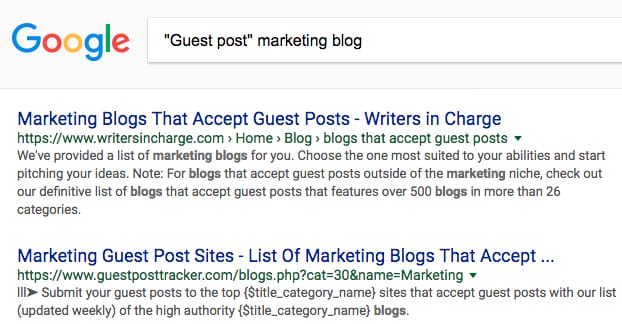
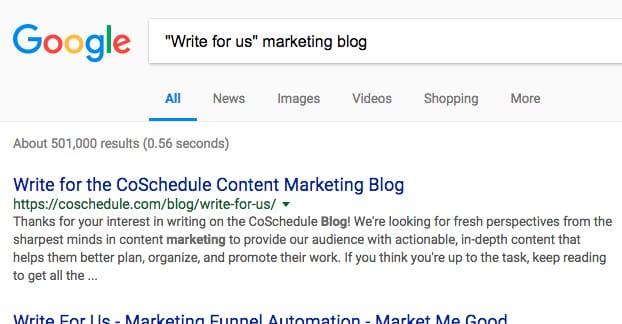
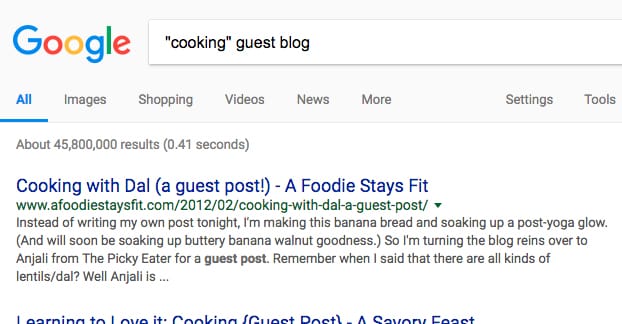
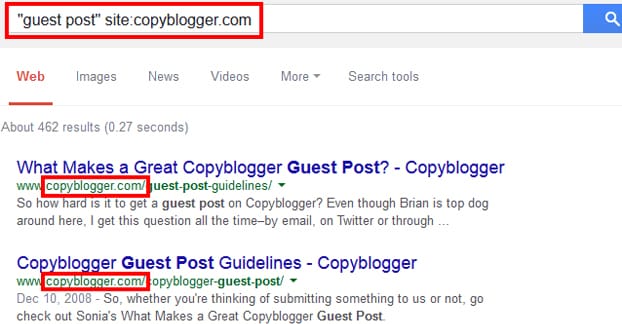
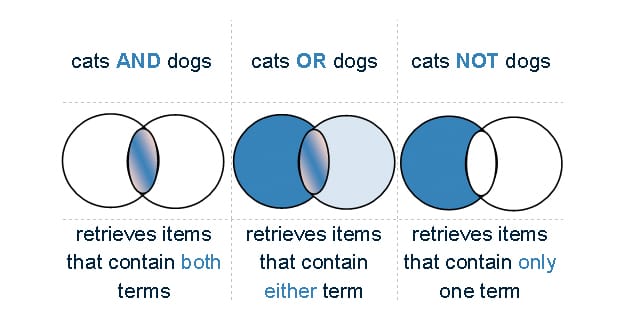




Steven
says:Do you have any recommendations for scraping tools when it comes to google search results scraping?
James Parsons
says:Hi Steven, Scrapebox seems to be the best one so far, but it is highly dependant on the quality of your proxies. Usually you’ll want some type of rotation pool of proxies so that they don’t get burned out from searching too fast. Private proxies don’t seem to work as well anymore.